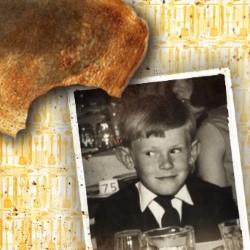Nigel Slater’s Toast is based on his award-winning autobiography, brought appetizingly to life in a play steeped in home-baking, real food and tales of love, loss and toast.
Vividly recreating suburban England in the 1960s, food writer, journalist and broadcaster Nigel Slater’s childhood is told through the tastes and smells he grew up with, warmly brought to the stage in Henry Filloux-Bennett’s adaptation with its superbly comic script and choreographed storytelling by Jonnie Riordan.
From making the perfect sherry trifle and waging war over cakes through to the playground politics of sweets and the rigid rules of restaurant dining, this is a moving tale as we live out Nigel’s relationship tied to the apron strings of his mum.
This play invades the senses and is brought to life by the nostalgic foods talked about, evoking memories of foods of our own childhoods (from tinned fruit and custard down to Black Jacks and sherbet Dip Dabs). We also get the opportunity to experience the foods by tasting them and smelling the wafts of cooking aromas emanating from the stage.
Not many plays come with an allergy warning, but pre-show advice warns you that small portions of food containing potential allergens will be present on stage and handed out to audiences, including milk, nuts and eggs.
Each audience member is given a Walnut Whip (now disappointingly called Whips) on entering the auditorium and asked to save it until later in the play in a scene portraying Slater’s coming of age. The audience partakes in the ritual of eating the Walnut Whip by biting off the walnut, followed by the top and then sticking your tongue down the chocolate pyramid bar and licking it out – though some audience members were unable to contain their excitement and had devoured it long before the allotted time.
Libby Watson’s nostalgic set evokes the period well, with green-and-yellow formica-fronted cupboards and 1950s lino kitchen, complete with lovely details down to the familiar cream-coloured Mason Cash mixing bowl and all-too-familiar crockery.
Alexandra Faye Braithwaite’s sound design and music composition help with setting the period and moving the play from scene to scene, with the likes of Carole King’s I Feel the Earth Move to Blue Velvet by Bobbie Vinton. Talking Head’s Psycho Killer is the perfect background music to a hilarious scene where Slater wages war on his father’s lover Joanie over a lemon meringue pie as they cavort around the stage on four catering trolleys, particularly memorable for its tight choreography. The audience even partakes in this scene by tasting some moreish miniature lemon meringue pies, made by Edinburgh caterer Barry Bryson of Cater.
Sam Newton as child and teenage Nigel is deliciously likeable and conveys the memories of the book, capturing Slater as the mummy’s boy with a passion for food who goes on to carve out a career in the industry. The supporting cast multi-role seamlessly as they play the various people who have shaped Slater’s life. Lizzie Muncey as the soft, caring mother is particularly brilliant and her portrayal of the cookery teacher Miss Adams gets a big laugh for its brilliant Dinner Ladies characterisation.
This is a real 90 minutes of pure nostalgic pleasure, played out brilliantly with a wonderfully pictorial script, accompanied by some descriptive use of sound and music and is nothing short of a feast for all the senses.
